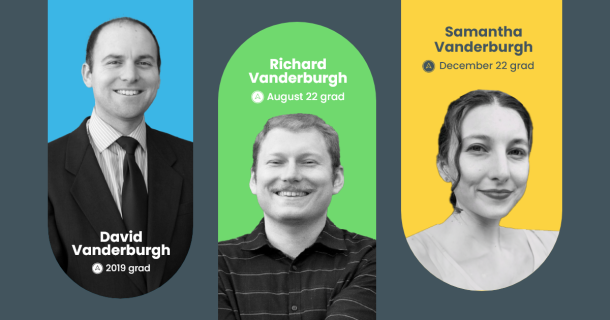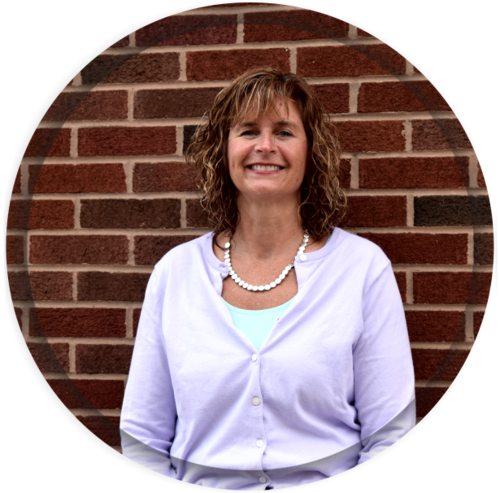Celebrating National Siblings Day with 3 Tech Elevator Career Changers (Q&A)
 First, it was David. Then Richard. Then Samantha.
First, it was David. Then Richard. Then Samantha.
One by one, three Vanderburgh siblings decided to attend Tech Elevator to launch new careers in software engineering.
To celebrate their success and commemorate National Siblings Day, we caught up with the three of them to talk about their bootcamp experiences and exciting new tech careers.
- David Vanderburgh worked in R&D at Honda for 10 years before attending Tech Elevator. Today, he’s a Sr. Frontend Developer at Physna.
- Richard Vanderburgh came from a STEM background but wanted to focus on software engineering. Today, he’s a Computer Engineer at the University of Dayton Research Institute.
- Samantha Vanderburgh had a French and finance background before shifting to tech. Today, she’s a Jr. Java Developer at Arcticom LLC.
Keep reading to learn more about their tech career journeys.
Who was the first to attend a Tech Elevator bootcamp? And what drew each of you to software engineering?
David: I was first, and this was back in 2019. Before that, I worked in R&D at Honda for a little over 10 years, and while I was there I got to do a little bit of software prototyping. It was nothing that was ever deployed to production or put in the hands of users – just rapid prototyping-type stuff. I decided I wanted to do that full-time, so I started looking into what it would take to transition. I started applying to some jobs directly and pretty much got declined left and right.
So I figured if I got some kind of formal education, that would help. Tech Elevator felt like the path of least resistance and I’m happy to say that it was. Instead of going back to college and getting another degree or getting a Master’s or something like that, I went ahead and did the bootcamp, and now here I am.
Richard: I went to Tech Elevator next in 2022. I come from a STEM background; I took physics in college and I was doing semi-technical stuff in my first job out of school, but I wanted to do more software engineering. It was hard to learn what I wanted to learn at my job and David had a lot of good things to say about Tech Elevator. It sounded like a good time, and I’m glad I did it.
Samantha: My path was a little bit less straightforward because I studied French in college and then I studied finance. I decided I didn’t like finance so much, but what I did like was the software development aspect of it. I knew I wanted to do something more technical, and because my brothers had gone through Tech Elevator, it seemed like a great way to get into tech. I went in 2022, as well. I figured it seemed like the path of least resistance for me, too. I went ahead and did it and everything worked out great.
Were there any family discussions about the bootcamp as a professional pathway?
David: At one point, I talked to my dad about how I didn’t like my job and I wanted to do software development, so he put me in touch with one of his friends who was a software developer. That gave me some ideas of what to do. I just remember my dad saying, ‘If you don’t like your job, you should make the jump.’
I had gone to an Open House at Tech Elevator to see that it was legitimate…and it was very reassuring to see. I felt confident that it was going to work out.
What are you all up to now?
Richard: After Tech Elevator, I was able to get a job at Radiance Technologies as a Software Developer. Tech Elevator definitely prepared me to be hireable for this position not only in the technical sense but also helping me practice for interviews.
I just started a new job at the University of Dayton Research Institute. I’m a Computer Engineer working on C++ projects for the Department of Defense. Tech Elevator didn’t directly teach me C++, but it did prepare me by teaching me the fundamentals of object-oriented programming.
Samantha: For about a year, I’ve been working as a Jr. Software Developer for a Department of Defense contractor. Everyone who works there is aware of Tech Elevator, and a lot of the hires are from Tech Elevator. I got this job, in part, because of graduating from Tech Elevator, because the company is so familiar with the program and how robust it is.
As for the job itself, all the people I work with are very kind and easy to work with. I’m just really happy with how everything has worked out.
David: I’m currently working at a company called Physna. If you’re into 3D modeling, we’re making a website called Thangs. I’m one of the front-end developers on the team. I’ve been there for about a year and a half. It’s a start-up and it’s very fast-paced, which is pretty awesome.
Before this, I worked at Cardinal Health. It’s a large pharmaceutical distribution company and I was doing mostly full-stack development. What was nice about working there was I got to meet with some really smart people who elevated my knowledge quickly. When they left the company, I followed them. It’s always nice to have really good mentors.
Do you have any advice for others who might be considering a coding bootcamp?
David: I think the major hesitation I had going in was the uncertainty of what was going to happen on the other side. And I know now, there’s probably more uncertainty because the job market is fluctuating. But at the end of the day, if you’re there for the right reasons, that’s what’s important. I feel like the ideal reason to attend a bootcamp is because you want to do software development, not necessarily only because it’s an extra $10,000 in your salary. Before anyone makes a jump and switches career paths, just think it through.
Ask yourself: Do I really want this? Is this going to be fun for me? Having fun is the thing that really got me through the program.
Richard: Even if you’re passionate about the technical stuff and you enjoy it and can continue working on it, finding a job can still be hard. But being able to network and connect with people, students, mentors, and everybody in the program is beneficial. Just try to have good conversations, try to meet as many people as you can, and go to the extra events. Try to get as many different perspectives as you can, and you never know what job might cross your path that you didn’t even know existed. Just openly and honestly talk to people, explore, and do a lot of digging.
Samantha: My advice is similar to what my brothers were saying. Just make sure that you like software development. It will be difficult at times to get a job, and for some people, it’ll be more difficult than others to get through the curriculum. I had a lot less experience with software development than David, so it was a little bit harder for me to get through the bootcamp, I think. But I did it with a lot of encouragement from my brothers and my parents. So I think my big piece of advice is, if you like software development, then it can be a great career for you, even though it can be difficult at times. If you enjoy it, ultimately, it will get easier.
Anything to add about your Tech Elevator experience, or anything else?
Richard: Everyone at Tech Elevator was awesome, super positive, but also realistic. They helped us all understand what to expect when we got out of the program and what things to watch out for. They helped get students in front of companies to interview and prepare for the interview process and go over the resumes and LinkedIn profiles. That was all invaluable.
You can learn the technical stuff, but the interpersonal stuff, and getting the business acumen, are very hard to develop on your own. Having that guidance really helps.
Samantha: The Pathway Program at Tech Elevator is so invaluable. My Pathway Director was extremely helpful and supportive. It was great having this support from people so knowledgeable of the industry.
David: One other piece of advice is to not get too caught up in the language you’re learning. You’re going to learn four, five, or six other languages throughout your career. As long as you are open to that, you’ll open a lot of doors for yourself.
Interested in exploring a career in software development?
Like David did when exploring his educational options, feel free to check out an upcoming Open House to learn more about our bootcamps, hiring partners, career preparation, and more.
If you’re ready to get started today, take the first step by completing our five-question Aptitude Test.

Written by Margaret Green,
Technical Skills Development Manager